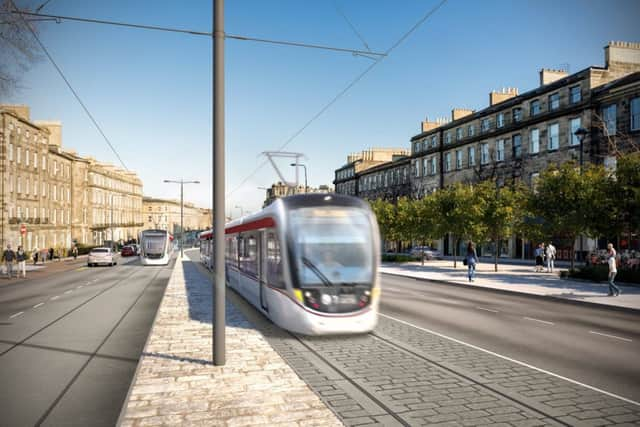Edinburgh Council budget: Claims services are being treated like ‘giant game of Jenga’
Threats to cut qualified teachers in nurseries were shelved but community policing will lose £522,000 of funding, economic development services will be cut by £1.2m and council tax will rise by 3 per cent while rents will go up by 2 per cent to pay for £874m of investment over the next five years.
The local authority will spend £66.7m on new or refurbished schools next year and £59.3m on early years services.
Advertisement
Hide AdAdvertisement
Hide AdAnd £30m will be used to fix potholes and resurface the Capital’s crumbling roads, with £11m to upgrade street lights and £5m on improving active travel. The council will also put £250,000 towards supported bus services in rural west Edinburgh.


But the £14m of cuts to the Edinburgh Integration Joint Board (IJB) along with £33m to core services has led to the authority making “difficult choices” in the 2019-20 budget.
As the Evening News revealed, the axe will fall on around 200 full time equivalent jobs.
Union leaders blasted councillors for a lack of responsibility for cuts to health and social care and said the public wasn’t given enough information before consultations.
Gerry Stovin, from the Unison’s Edinburgh branch, said: “We seem to have pushed out health and social care staff on to a fringe like it’s not our problem anymore. There’s going to be serious cuts to health and social care.”
Unison said that council services were being treated like a “giant game of Jenga” and “being cut to the bone”.
Health and social care services will have more money than it received this year but will have to make £14m of savings from the council and up to £10m from the NHS to meet increased spending plans – while £2.5m of the council’s funding will only be handed over if services make improvements. Council leader, Cllr Adam McVey, said: “As a council, we are working hard to ensure all residents can share in Edinburgh’s success.
“This budget lives up to that commitment.
“It is a strong budget for the city and for our residents, particularly those most in need of our support.
Advertisement
Hide AdAdvertisement
Hide Ad“It is a budget that allows us to invest in key front-line services but also one that allows us to continue investing in the huge ambition we have for our capital city – ensuring our economy and public services are more inclusive so everyone can enjoy the benefits of sustainable and well-managed growth.“
The council has reduced a proposed £567,000 cut to Marketing Edinburgh to £300,000 on the promise that a business plan will be brought forward for the organisation to be self-sufficient in future years.
Gordon Robertson, chairman of Marketing Edinburgh, said: “We will now move forward to focus on the next step in the evolution of Marketing Edinburgh to become a destination marketing management organisation.
“That said, £300,000 is a significant cut and will need to be managed carefully. Our focus now will be to co-produce an appropriate business model which continues to deliver our services to the City of Edinburgh and our members within the revised budget.”
Opposition parties tabled their own proposals, with the Tories calling for the planned tram extension to be scrapped, claiming it would free up £90m of extra public funding, including a £20m dividend from Lothian Buses, despite no guarantee the cash can be used for other purposes. The Tories said the administration was choosing to press ahead with the extension in the current difficult financial climate, but called for “schools, not trams” and also proposed that council tax rise is capped at two per cent.
The Conservative finance spokesperson, Cllr Graham Hutchison, said: “The Conservative budget offers £90m of additional investment in the capital programme.
“Rejecting the tram extension at this time unlocks the funding to build three new high schools.”
But the finance convener, Cllr Alasdair Rankin, labelled the proposals to scrap the tram as “so short-sighted, it’s unbelievable”.
Advertisement
Hide AdAdvertisement
Hide AdGreen councillors, calling for more funding for health and social care, also tabled plans to borrow money to deliver new schools and additional measures to tackle homelessness.
Green finance spokesperson Cllr Gavin Corbett said that, despite the “bleak” financial picture, “we can still make choices that are good for Edinburgh and our future”.
The Liberal Democrats called for a £4m priority fund for roads and pavements, abolishing the garden waste charge and halting cuts to Edinburgh Leisure and community policing.
The Liberal Democrat finance spokesperson, Cllr Neil Ross, said the no compulsory redundancy policy “really has to questioned” when high salaries in the authority could go towards public services.
He added that the council needs to “refocus on getting basic services right”.
Labour Cllr Maureen Child, who stepped in for former finance vice convener Marion Donaldson, who quit as a councillor last month, made a passionate speech about the lack of support from the Scottish Government. Local authorities have received less money from Holyrood as part of the local government settlement.
Speaking after the meeting, she labelled the funding cuts from Holyrood as “an abuse of power”.
She said: “We are the ones that actually deliver on the ground, the things that really matter to people. I don’t feel we get the support and recognition of those vital services for people.
Advertisement
Hide AdAdvertisement
Hide Ad“There comes a point when we can’t do more with less. It’s an abuse of power and a lack of recognition that we are an equal partner.”
Council tax will rise by three per cent, while council house rents will go up by two per cent to pay for £874m of investment over the next five years to improve living standards.
Betty Stevenson from Edinburgh Tenants Federation, protested against council house rents increasing by two per cent.
She said: “Tenants are having to choose between heating their homes and providing food for their families. They can’t afford both.”